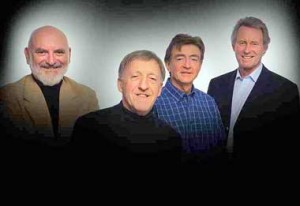For all of you who have had to make the painful choice between the Philadelphia St. Patrick’s Day Parade and the Chieftains concert at the Kimmel—they seem always to happen on the same day—this year there’s no pain at all. The parade has been pushed back to Sunday, March 9, to avoid a conflict with Palm Sunday, and the Chieftains are in town on Saturday, March 15.
Paddy Moloney, leader of Ireland’s pioneering Irish traditional band, couldn’t be more delighted. For one, Philadelphia is a hotbed of Irish traditional music. For another, the Kimmel is just a great place to perform.
“It’s very warm. You look up [from the stage], and the hall is shaped like an egg. It’s almost like the people are with you in your parlor back home—a very expensive parlor, let me tell you.”
Moloney, who is on the board of directors for a new national concert hall auditorium in Dublin, says he hopes that performance venue will take a few lessons from the Kimmel, where the sound is phenomenal, yet the space seems so intimate. “I’ve shown them photographs,” he says.
Moloney and the Chieftains are always mining other genres for concert and recording material—a fact that drives some hard-core traditionalists a little crazy and bothers Moloney not at all. But this time, the Chieftains are not straying too far from Ireland.
“I’m going down the Scottish route,” he says. “I call it the Chieftains Scottish-Celtic connection.”
It’s a logical choice for Moloney, who in 2005 was inducted into the Scots Traditional Music Hall of Fame. He was the first non-Scot so honored.
Joining the Chieftains—Moloney (tin whistle, uilleann pipes), Sean Keane (fiddle), Matt Molloy (flute), Kevin Conneff (bodhran and vocals)—will be Alyth McCormack, from the small Scottish island of Lewis in the Outer Hebrides. “Her singing is just fantastic,” he says. “She’ll come on in the last section of the second half, blending our Irish with her Scottish style.”
Also on stage will be the brilliant Irish harper Triona Marshall. “She’ll do a version of Carolan’s concerto,” says Moloney. “It’s the best I’ve ever heard.” Marshall fills a gap in the Chieftains’ legendary sound left by the death of Derek Bell in October 2002.
Carmel Conway, a superb singer from Limerick with both classical and contemporary influences, will also join the show, as will Cuban-born Philadelphia percussionist Juan Castellanos, also known simply as “Cuco.” Look for the longtime Chieftains players, dancer Cara Butler and those crazy-legs Pilatske brothers, Jon and Nathan, from Canada’s Ottawa Valley, who were such a hit at the Kane Sisters’ Irish Center concert in July. Singer-dancer Maureen Fahey also rounds out the ensemble. (Look for an appearance by some local pipers, too.)
Quite the international cast—but that, too, is just fine with Moloney, who confesses, “I find the world now a very small place.”
It was quite another world when, back in 1963, the one-time accountant laid the groundwork for what would become the Chieftains.
It was a journey that began in 1938 in the northside Dublin suburb of Donnycarney, where Moloney was born and raised—and before then, really. Like so many traditional Irish musicians, Moloney was born into the music. House parties were common. Indeed, he says, “Music was the main source of entertainment in the family.” Moloney’s grandfather played the flute, and an uncle played in the Ballyfin Pipe Band. “He was a great pipe player,” says Moloney. “I grew up with this madness in me head.”
At age 6, his mother presented him with a whistle, purchased for a shilling and ninepence. He began to pick it up right away.
The uilleann pipes soon followed. “Every Saturday night [the world-famous piper] Leo Rowsome used to have a show on the radio. I listened to it all the time,” Moloney says. “When I was 8 or 9 I met his son in my school. The first time I saw them [the pipes] in reality, I was just blown away.”
Moloney implored his mother to secure a set of pipes for him. “Those pipes cost my mother a week’s wages,” he recalls. “She stuck it out and saved the money for them. Fortunately, I had the God-given gift.”
You bet he did. Not long after he started taking lessons from Rowsome (who also built his pipes), Moloney scored a first in the Dublin Feis. Next, came All-Ireland championships.
It was quite the time. “I was very lucky in Donnycarney,” he recalls. “There were five pipers there, including Leo, Danny O’Dowd, and myself. We went to one anothers houses. There was also lots of open-air music playing and ceili dancing, and various traditional concerts. There were a few good music clubs.”
Through it all, he was sustained and inspired by the more experienced pipers in the crowd. “I got tremendous help from the older people,” he says. “They saw in me the continuation of good piping.”
You can see for yourself why the old ones were so encouraging when the Chieftains return to the Kimmel March 15 at 3 p.m. A dinner with the Chieftains follows the concert.

